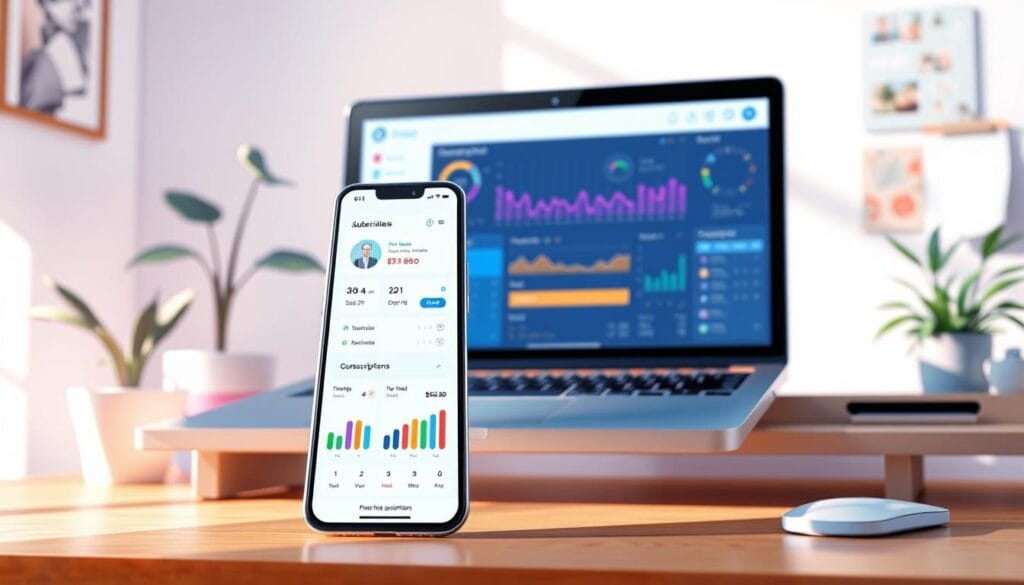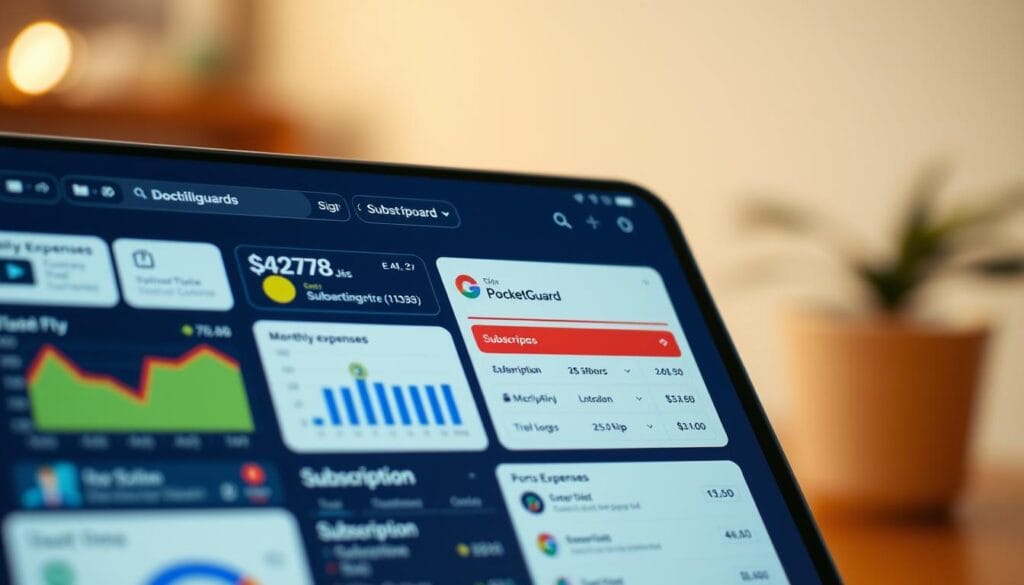Did you know the average American spends $219 per month on recurring services? With over seven different types of subscriptions per user, keeping track of these payments can be overwhelming. From streaming platforms to fitness memberships, the growing reliance on these services has created a need for smarter solutions.
Specialized tools have emerged to help users track and optimize their recurring payments. These solutions offer features like payment tracking, cancellation assistance, and budgeting insights. A recent analysis by CNBC Select compared over 12 tools, highlighting their pricing and unique features.
Among the top options are Rocket Money, Trim, and PocketGuard. Each of these platforms provides a tailored approach to managing recurring expenses. By leveraging these tools, users can gain better control over their finances and avoid unnecessary charges.
Key Takeaways
- The average user spends $219 monthly on recurring services.
- Over seven subscription types are common per household.
- Specialized tools help track and optimize payments.
- CNBC Select analyzed 12+ tools for pricing and features.
- Top solutions include Rocket Money, Trim, and PocketGuard.
Why Subscription Management Apps Are Essential

The hidden costs of unused subscriptions are draining wallets nationwide. Many Americans underestimate their monthly spending on recurring services by 61%, believing they spend $86 when the actual average is $219. This gap highlights the need for better financial oversight.
Psychological factors often lead to overspending. People tend to forget about services they no longer use, resulting in wasted money. A case study revealed that unused subscriptions can cost households up to $2,600 annually. Automated tracking tools eliminate this issue by identifying and canceling unnecessary payments.
These tools also save time. Manual tracking using spreadsheets is tedious and error-prone. In contrast, automated solutions provide real-time updates and alerts, ensuring users stay informed about their spending. This efficiency translates into significant savings.
For example, Rocket Money reports that 80% of its users save money through subscription cancellations. Similarly, Trim users save over $600 annually on average. These platforms often charge a fee, but the return on investment is clear. For every dollar spent on the app, users save multiples in avoided charges.
“The key to financial control is awareness. Tools that track recurring payments empower users to make informed decisions.”
Additionally, some platforms offer bill negotiation services, further reducing costs. Rocket Money, for instance, successfully negotiates lower rates for users in 30-60% of cases. This feature alone can justify the app’s fee, making it a valuable addition to any financial toolkit. For more insights, explore effective solutions to streamline your finances.
Top Subscription Management Apps for 2024
![]()
In 2024, staying on top of recurring expenses is easier than ever with advanced tools. These platforms help users track, optimize, and save on monthly payments. Among the top options are Rocket Money, Trim, and PocketGuard, each offering unique features tailored to different needs.
Rocket Money: Best for Tracking and Saving
Rocket Money stands out for its intuitive dashboard and comprehensive tracking capabilities. It helps users monitor their recurring payments and identify unused services. The app also offers bill negotiation, saving users an average of $720 annually.
With a premium plan costing $4-$12 per month and a 7-day trial, Rocket Money is a cost-effective solution. Its secure AWS hosting and 256-bit encryption ensure user data remains protected.
Trim: Best for Text-Based Management
Trim takes a unique approach with its SMS-based interface, processing over 15,000 user queries monthly. This makes it ideal for those who prefer text-based interactions. The app also excels in savings, helping users cut unnecessary expenses.
Trim’s simplicity and efficiency make it a favorite among users looking for a hassle-free way to manage their bank accounts and recurring payments.
PocketGuard: Best for Budgeting Integration
PocketGuard goes beyond tracking by integrating budgeting tools. Its “In My Pocket” algorithm provides real-time spending insights, helping users stay within their budget. The Plus plan, priced at $74.99 annually, includes a debt payoff planner.
With high mobile optimization scores on both iOS and Android, PocketGuard ensures a seamless user experience. Its focus on budgeting makes it a top choice for those looking to align their subscriptions with financial goals.
“The right tool can transform how you manage your finances, saving both time and money.”
For more insights on optimizing your finances, explore low-fee robo-advisors that complement these apps.
Key Features to Look for in Subscription Management Apps

Modern financial tools offer more than just tracking—they empower users to save smarter. These platforms come equipped with advanced features designed to simplify financial oversight and maximize savings. From automated alerts to bill negotiation, the right tools can transform how you handle recurring expenses.
Automated Tracking and Alerts
One of the most valuable features is automated tracking. Transaction categorization algorithms use rule-based systems and machine learning to analyze spending patterns1. This ensures users stay informed about their payment habits without manual effort.
Real-time alerts notify users of upcoming bills or unusual activity. This proactive approach helps avoid late fees and unnecessary charges, making it a must-have for financial efficiency.
Bill Negotiation Services
Another standout feature is bill negotiation. Platforms like Trim charge a 33% fee on negotiated savings but often secure significant reductions2. Negotiating with providers like Comcast or Verizon can lead to substantial savings, especially when bundled with other services2.
Utility providers, however, may have less flexibility due to regulatory constraints. Exploring alternative providers or adjusting service plans can still yield cost reductions2.
Bank Account Synchronization
Seamless integration with bank accounts is essential for comprehensive financial oversight. Tools using Plaid API standards ensure secure and efficient data sharing3. However, some banks like Chase and Capital One have restricted third-party access, highlighting the need for secure authentication methods like OAuth4.
OAuth 2.0 enhances security by using token-based authentication, reducing the risk of unauthorized access3. This ensures users’ financial data remains protected while enabling smooth synchronization.
“The right features not only save time but also empower users to make informed financial decisions.”
By leveraging these advanced features, users can achieve greater control over their finances. Whether it’s automated tracking, bill negotiation, or secure bank account integration, these tools are designed to optimize savings and streamline financial management.
How Rocket Money Stands Out

Rocket Money has become a standout solution for users seeking better control over their finances. Its premium features and pricing structure make it a top choice for those looking to optimize their spending.
Premium Features and Pricing
Rocket Money offers a 7-day free trial with a conversion rate of 68%. Its premium tier, priced between $4 and $12 per month, includes advanced tools like Smart Savings and net worth tracking. These features provide users with a comprehensive view of their financial health.
The app’s concierge cancellation workflow simplifies the process of stopping unused services. This feature alone has helped users save over $100M since 2022. Additionally, VantageScore 3.0 credit monitoring ensures users stay informed about their credit status.
Success Rates for Subscription Cancellations
Rocket Money excels in identifying and canceling unnecessary bills. Its success rate for subscription cancellations is unmatched, making it a reliable tool for reducing monthly expenses. Users report significant savings, often justifying the app’s cost within months.
Compared to legacy tools like Mint, Rocket Money offers a more streamlined and user-friendly experience. Its corporate structure, affiliated with Rocket Companies, ensures robust support and continuous innovation.
“Rocket Money’s ability to save users time and money makes it an essential tool for modern financial management.”
For those looking to take control of their finances, Rocket Money provides a powerful and efficient solution. Its premium features and proven success rates make it a leader in the field.
Trim: A Unique Approach to Subscription Management

Trim offers a distinctive way to handle recurring payments, setting it apart from traditional tools. Its innovative SMS-based communication and robust savings features make it a standout choice for users seeking simplicity and efficiency.
SMS-Based Communication
Trim’s text-based interface is designed for ease of use, particularly appealing to older demographics. Users can manage their services and track bills through simple SMS commands. This approach eliminates the need for complex apps, making it accessible to a wider audience.
With over 15,000 user queries processed monthly, Trim’s system ensures quick and reliable responses. Its 14-day trial retention rate of 82% highlights its effectiveness and user satisfaction.
Savings and Negotiation Capabilities
Trim excels in helping users save money by identifying and canceling unnecessary subscriptions. Its negotiation services have successfully reduced bills for many users, though it excludes certain providers like satellite radio.
The platform also offers an FDIC-insured savings account with a 4% APY, providing users with a secure way to grow their savings. This integration adds significant value to its core features.
“Trim’s simplicity and focus on savings make it a powerful tool for anyone looking to streamline their finances.”
Security is a top priority for Trim, with VGS tokenization ensuring user data remains protected. Its partnership with OneMain Financial further enhances its credibility and reach. For more insights on financial tools, explore effective solutions to optimize your spending.
PocketGuard: More Than Just Subscription Tracking

PocketGuard has emerged as a versatile financial tool, offering more than just basic tracking capabilities. With a 50% year-over-year user growth, this app has become a go-to solution for individuals seeking better control over their money and spending habits.
Its premium tier, priced at $155.88 annually, provides advanced features that go beyond simple expense tracking. Users benefit from a 93% transaction categorization accuracy, ensuring precise insights into their financial behavior.
Budgeting Tools and Spending Insights
PocketGuard’s budgeting tools are designed to help users stay on top of their finances. The “In My Pocket” algorithm offers real-time insights into available funds after accounting for bills and savings goals. This feature empowers users to make informed decisions about their spending.
Additionally, the app allows for spending category customization and merchant-specific budget alerts. These features ensure users can tailor the tool to their unique financial needs, making it a highly personalized solution.
Debt Payoff Planning
For those managing debt, PocketGuard integrates the snowball and avalanche methods into its payoff planner. This approach helps users prioritize their repayments strategically, whether they focus on smaller balances first or higher-interest debts.
The app also includes receipt scanning OCR capabilities, making it easier to track expenses and stay organized. By combining these tools, PocketGuard provides a comprehensive solution for both budgeting and debt management.
“PocketGuard’s ability to simplify complex financial tasks makes it an essential tool for modern users.”
Trusted by over 825,754 people, PocketGuard continues to innovate, offering features that align with users’ financial goals. For more insights on optimizing your finances, explore effective strategies to maximize your savings.
Security Considerations for Subscription Apps

Protecting sensitive financial information is critical in today’s digital landscape. With cyber threats on the rise, users must ensure their data is secure when using financial tools. Encryption and privacy policies play a vital role in safeguarding personal and bank details.
Data Encryption and Privacy Policies
Robust encryption is a cornerstone of secure platforms. For instance, Rocket Money utilizes AWS GovCloud, ensuring compliance with stringent security standards. Similarly, Trim has adopted two-factor authentication, enhancing user access protection.
Privacy policies are equally important. Tools like Chase Mobile® employ 128-bit encryption, a benchmark for securing financial information. Users should verify if platforms comply with regulations like GDPR or CCPA, which govern data residency and usage.
How to Choose a Secure App
Selecting a secure app involves evaluating its security certifications. Look for SOC 2 Type II compliance, which indicates rigorous auditing of data handling practices. Third-party audit transparency is another key factor, as it ensures accountability.
Analyzing a platform’s breach history can provide insights into its reliability. For example, the 2023 LastPass incident highlights the importance of proactive security measures. Additionally, biometric authentication, such as fingerprint or facial recognition, adds an extra layer of protection.
“Security is not just a feature; it’s a necessity for building trust in financial tools.”
For more insights on safeguarding your finances, explore how AI is transforming personal finance.
Alternatives to Subscription Tracker Apps
Many users are exploring alternatives to automated tools for handling recurring expenses. While digital solutions offer convenience, some prefer manual methods or dedicated credit cards to manage their subscriptions. These approaches provide flexibility and control, especially for those who enjoy hands-on financial oversight.
Manual Tracking Methods
For individuals who prefer a more traditional approach, manual tracking remains a popular choice. According to G2 data, 43% of users rely on spreadsheets to monitor their recurring payments. This method allows for customization and a detailed overview of expenses.
Another effective strategy is organizing emails using Gmail filters. By creating labels and rules, users can automatically sort receipts and reminders related to their account activity. This system ensures that important information is easily accessible.
Using Dedicated Credit Cards
Dedicated credit cards are another practical alternative. Cards like Amex Platinum® offer credits for specific purchases, making them ideal for recurring expenses. Similarly, Chase Sapphire provides rewards that can offset costs.
However, users should be aware of chargeback limitations. While these cards offer benefits, disputing unauthorized charges can be challenging. It’s essential to review the terms and conditions before relying on this strategy.
“Manual methods and dedicated cards provide flexibility, but they require consistent effort to be effective.”
For those considering these alternatives, a cost-benefit analysis is crucial. Weighing the time spent on manual tracking against app fees can help determine the best approach. Additionally, integrating tax deduction tracking can further optimize financial oversight.
How to Get Started with Subscription Management
Taking control of recurring expenses begins with the right tools and strategies. Whether you’re new to financial tracking or looking to optimize your current setup, the process is straightforward and rewarding. With an average setup time of just 11 minutes, getting started is easier than you might think.
Setting Up Your First App
Begin by choosing a reliable platform that suits your needs. Most users connect three or more accounts initially, ensuring comprehensive tracking of their bills and subscriptions. Follow the step-by-step onboarding guide provided by the app to link your accounts securely.
Permission management is crucial during this phase. Grant access only to the necessary accounts and review the app’s privacy policies. This ensures your account data remains protected while enabling seamless synchronization.
Tips for Maximizing Savings
Once your app is set up, focus on optimizing your savings. Use built-in features like negotiation scripts to reduce recurring costs. For example, many platforms offer templates for DIY savings, helping you communicate effectively with service providers.
Regular audits are also essential. Create a quarterly checklist to review your subscriptions and cancel unused services. This proactive approach ensures you’re only paying for what you truly need.
“A well-organized financial tool can save you both time and money, making it a valuable addition to your routine.”
By following these steps, you’ll gain better control over your finances and maximize your savings potential. Start today and experience the benefits of streamlined expense tracking.
Conclusion
Effective financial oversight can lead to significant savings and better control over recurring expenses. Studies show that users can reduce subscription waste by an average of 23% by leveraging the right tools. This highlights the importance of staying informed and proactive in managing recurring payments.
Looking ahead, AI-powered spending predictions are set to revolutionize how users track and optimize their finances. These advancements will provide more accurate insights, helping individuals make smarter decisions about their money and services.
For those seeking tailored solutions, a final recommendation matrix based on specific use cases can guide the selection process. Whether prioritizing budgeting, negotiation, or security, there’s an app designed to meet diverse needs.
To experience the benefits firsthand, consider a 30-day tracking challenge. This practical approach allows users to identify unnecessary expenses and optimize their spending habits effectively.
The industry is projected to grow at a 15% CAGR through 2029, reflecting the increasing demand for financial management solutions. By adopting these tools now, users can stay ahead of the curve and achieve long-term financial stability.
FAQ
Why should I use a subscription tracker?
How do these apps track my subscriptions?
Are subscription management apps secure?
Can these apps help me save money?
What features should I look for in a subscription tracker?
How does Rocket Money compare to other apps?
What makes Trim unique?
Does PocketGuard offer more than subscription tracking?
Are there alternatives to using these apps?
How do I get started with a subscription tracker?
Source Links
- https://www.finextra.com/blogposting/17904/understanding-transaction-categorization-algorithms-in-financial-services
- https://www.fcc.gov/consumers/guides/understanding-your-telephone-bill
- https://www.owasp.org/index.php/OAuth_2.0
- https://www.americanbanker.com/news/chase-capital-one-limit-third-party-access-to-account-data

